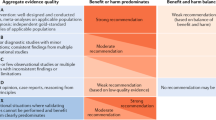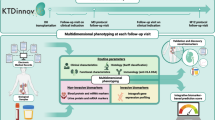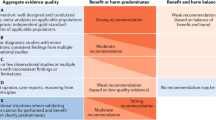Abstract
Background
Dense deposit disease (DDD) is an ultra-rare renal disease.
Methods
In the study reported here, 98 patients and their families participated in a descriptive patient-centered survey using an online research format. Reports were completed by patients (38%) or their parents (62%). Age at diagnosis ranged from 1.9 to 38.9 years (mean 14 years).
Results
The majority of patients presented with proteinuria and hematuria; 50% had hypertension and edema. Steroids were commonly prescribed, although their use was not evidence-based. One-half of the patients with DDD for 10 years progressed to end-stage renal disease (ESRD), with young females having the greatest risk for renal failure. Of first allografts, 45% failed within 5 years, most frequently due to recurrent disease (70%). Type 1 diabetes (T1D) was present in over 16% of families, which represents a 116-fold increase in incidence compared with the general population (p < 0.001).
Conclusions
Based on these findings, we suggest that initiatives are needed to explore the high incidence of T1D in family members of DDD patients and the greater risk for progression to ESRD in young females with DDD. These efforts must be supported by sufficient numbers of patients to establish evidence-based practice guidelines for disease management. An international collaborative research survey should be implemented to encourage broad access and participation.

Similar content being viewed by others
References
Nasr S, Valeri A, Appel GB, Sherwinter J, Stokes MB, Said SM, Markowitz GS, D'Agati VD (2009) Dense deposit disease: clinicopathologic study of 32 pediatric and adult patients. Clin J Am Soc Nephrol 4:22–32
Strobel S, Zimmering M, Papp K, Prechl J, Jozsi M (2010) Anti-factor B autoantibody in dense deposit disease. Mol Immunol 47:1476–1483
Walker PD, Ferrario F, Joh K, Bonsib SM (2007) Dense deposit disease is not a membranoproliferative glomerulonephritis. Mod Pathol 20:605–616
Smith RJ, Alexander J, Barlow PN, Botto M, Cassavant TL, Cook HT, de Córdoba SR, Hageman GS, Jokiranta TS, Kimberling WJ, Lambris JD, Lanning LD, Levidiotis V, Licht C, Lutz HU, Meri S, Pickering MC, Quigg RJ, Rops AL, Salant DJ, Sethi S, Thurman JM, Tully HF, Tully SP, van der Vlag J, Walker PD, Würzner R, Zipfel PF; Dense Deposit Disease Focus Group (2007) New approaches to the treatment of dense deposit disease. J Am Soc Nephrol 18:2447–2456
Smith RJ, Harris CL, Pickering MC (2011) Dense deposit disease. Mol Immunol 48:1604–1610
Sethi S, Fervenza FC, Zhang Y, Nasr SH, Leung N, Vrana J, Cramer C, Nester CM, Smith RJ (2011) Proliferative glomerulonephritis secondary to dysfunction of the alternative pathway of complement. Clin J Am Soc Nephrol 6:1009–1017
Appel GB, Cook HT, Hageman G, Jennette JC, Kashgarian M, Kirschfink M, Lambris JD, Lanning L, Lutz HU, Meri S, Rose NR, Salant DJ, Sethi S, Smith RJ, Smoyer W, Tully HF, Tully SP, Walker P, Welsh M, Würzner R, Zipfel PF (2005) Membranoproliferative glomerulonephritis type II (dense deposit disease): an update. J Am Soc Nephrol 16:1392–1403
Public law 107–280 (2002) Rare Diseases Act of 2002. Public law 107–280. Available at: http://history.nih.gov/research/downloads/PL107-280.pdf
Misra A, Peethambaram A, Garg A (2004) Clinical features and metabolic and autoimmune derangements in acquired partial lipodystrophy: report of 35 cases and review of the literature. Medicine (Baltimore) 83:18–34
D'souza YB, Jones CJ, Short CD, Roberts IS, Bonshek RE (2009) Oligosaccharide composition is similar in drusen and dense deposits in membranoproliferative glomerulonephritis type II. Kidney Int 75:824–827
Smith RJH, Sethi S, Zipfel PF (2011) Dense deposit disease/membranoproliferative glomerulonephritis type II. Available at: http://history.nih.gov/research/downloads/PL107-280.pdf. Updated 2011. Accessed 2 July 2011
Pickering MC, Warren J, Rose KL, Carlucci F, Wang Y, Walport MJ, Cook HT, Botto M (2006) Prevention of C5 activation ameliorates spontaneous and experimental glomerulonephritis in factor H-deficient mice. Proc Natl Acad Sci USA 103:9649–9654
Ponticelli C, Glassock RJ (1997) Treatment of Primary Glomerulonephritis, 2nd edn. Oxford University Press, Oxford
Cameron JS, Turner DR, Heaton J, Williams DG, Ogg CS, Chantler C, Haycock GB, Hicks J (1983) Idiopathic mesangiocapillary glomerulonephritis. Comparison of types I and II in children and adults and long-term prognosis Am J Med 74:175–192
Liu JC, Yang JY, Xiao HJ, Huang JP, Yao Y, Li X, Wang SX (2009) Clinical and pathological characteristics of children with dense deposit disease. Zhonghua Er Ke Za Zhi 47:593–597
Cansick JC, Lennon R, Cummins CL, Howie AJ, McGraw ME, Saleem MA, Tizard EJ, Hulton SA, Milford DV, Taylor CM (2004) Prognosis, treatment and outcome of childhood mesangiocapillary (membranoproliferative) glomerulonephritis. Nephrol Dial Transplant 19:2769–2777
Lu DF, McCarthy AM, Lanning LD, Delaney C, Porter C (2007) A descriptive study of individuals with membranoproliferative glomerulonephritis. Nephrol Nurs J 34:295–302, quiz 303
Little MA, Dupont P, Campbell E, Dorman A, Walshe JJ (2006) Severity of primary MPGN, rather than MPGN type, determines renal survival and post-transplantation recurrence risk. Kidney Int 69:504–511
Schwertz R, de Jong R, Gretz N, Kirschfink M, Anders D, Scharer K (1996) Outcome of idiopathic membranoproliferative glomerulonephritis in children. Arbeitsgemeinschaft Pädiatrische Nephrologie. Acta Paediatr 85:308–312
Braun MC, Stablein DM, Hamiwka LA, Bell L, Bartosh SM, Strife CF (2005) Recurrence of membranoproliferative glomerulonephritis type II in renal allografts: The North American Pediatric Renal Transplant Cooperative Study experience. J Am Soc Nephrol 16:2225–2233
Dizdar O, Kahraman S, Gençtoy G, Ertoy D, Arici M, Altun B, Yasavul U, Turgan C (2004) Membranoproliferative glomerulonephritis associated with type 1 diabetes mellitus and Hashimoto's thyroiditis. Nephrol Dial Transplant 19:988–989
Srikanta S, Malaviya AN, Rajagopalan P, Bhuyan UN, Ahuja MM (1983) Association of type I (insulin-dependent) diabetes mellitus, autoimmunity, antinuclear antibody, and membranoproliferative glomerulonephritis. Diabetes Care 6:71–74
Heinig M, Petretto E, Wallace C, Bottolo L, Rotival M, Lu H, Li Y, Sarwar R, Langley SR, Bauerfeind A, Hummel O, Lee YA, Paskas S, Rintisch C, Saar K, Cooper J, Buchan R, Gray EE, Cyster JG; Cardiogenics Consortium, Erdmann J, Hengstenberg C, Maouche S, Ouwehand WH, Rice CM, Samani NJ, Schunkert H, Goodall AH, Schulz H, Roider HG, Vingron M, Blankenberg S, Münzel T, Zeller T, Szymczak S, Ziegler A, Tiret L, Smyth DJ, Pravenec M, Aitman TJ, Cambien F, Clayton D, Todd JA, Hubner N, Cook SA (2010) A trans-acting locus regulates an anti-viral expression network and type 1 diabetes risk. Nature 467:460–464
Holcomb CL, Hoglund B, Anderson MW, Blake LA, Böhme I, Egholm M, Ferriola D, Gabriel C, Gelber SE, Goodridge D, Hawbecker S, Klein R, Ladner M, Lind C, Monos D, Pando MJ, Pröll J, Sayer DC, Schmitz-Agheguian G, Simen BB, Thiele B, Trachtenberg EA, Tyan DB, Wassmuth R, White S, Erlich HA (2011) A multi-site study using high-resolution HLA genotyping by next generation sequencing. Tissue Antigens 77:206–217
Leung AK, Wong AH (2010) Proteinuria in children. Am Fam Physician 82:645–651
Kalaitzidis R, Bakris GL (2009) Effects of angiotensin II receptor blockers on diabetic nephropathy. J Hypertens Suppl 27:S15–S21
Galle J (2008) Reduction of proteinuria with angiotensin receptor blockers. Nat Clin Pract Cardiovasc Med 5[Suppl 1]:S36–S43
Alchi B, Jayne D (2010) Membranoproliferative glomerulonephritis. Pediatr Nephrol 25:1409–1418
Donadio JV Jr, Offord KP (1989) Reassessment of treatment results in membranoproliferative glomerulonephritis, with emphasis on life-table analysis. Am J Kidney Dis 14:445–451
West CD (1992) Idiopathic membranoproliferative glomerulonephritis in childhood. Pediatr Nephrol 6:96–103
Shaw AC, Joshi S, Greenwood H, Panda A, Lord JM (2010) Aging of the innate immune system. Curr Opin Immunol 22:507–513
Gameiro C, Romao F (2010) Changes in the immune system during menopause and aging. Front Biosci (Elite Ed) 2:1299–1303
Gonzalez DA, Diaz BB, Rodriguez Perez Mdel C, Hernandez AG, Chico BN, de Leon AC (2010) Sex hormones and autoimmunity. Immunol Lett 133:6–13
Riaño-Galán I, Málaga S, Rajmil L, Ariceta G, Navarro M, Loris C, Vallo A (2009) Quality of life of adolescents with end-stage renal disease and kidney transplant. Pediatr Nephrol 24:1561–1568
Pradel FG, Jain R, Mullins CD, Vassalotti JA, Bartlett ST (2008) A survey of nephrologists’ views on preemptive transplantation. Clin J Am Soc Nephrol 3:1837–1845
Boehm M, Winkelmayer WC, Arbeiter K, Mueller T, Aufricht C (2010) Late referral to paediatric renal failure service impairs access to pre-emptive kidney transplantation in children. Arch Dis Child 95:634–638
Davis CL (2010) Preemptive transplantation and the transplant first initiative. Curr Opin Nephrol Hypertens 19:592–597
U.S. Renal Data System (2009) USRDS 2009 annual data report: atlas of end-stage renal disease in the United States. National Institutes of Diabetes and Digestive and Kidney Diseases, National Institutes of Health, Bethesda
American Academy of Pediatrics. Recommendations for preventive pediatric health care. Available at: http://brightfutures.aap.org/pdfs/AAP%20Bright%20Futures%20Periodicity%20Sched%20101107.pdf. Updated 2008. Accessed 12 Aug 2011
Iitaka K, Igarashi S, Sakai T (1994) Hypocomplementaemia and membranoproliferative glomerulonephritis in school urinary screening in Japan. Pediatr Nephrol 8:420–422
Putkowski S (2010) The National Organization for Rare Disorders (NORD): providing advocacy for people with rare disorders. NASN School Nurse 25:38–41. Available at: http://search.ebscohost.com/login.aspx?direct=true&db=jlh&AN=2010524084&site=ehost-live
Acknowledgments
The authors would like to acknowledge the generous support from the University of Iowa Information Technology Service, Research Service. Mr. Timothy VanFosson developed the online research survey platform. This work was supported in part by NIH grant DK074409 to RJHS.
Author information
Authors and Affiliations
Corresponding author
Rights and permissions
About this article
Cite this article
Lu, DF., Moon, M., Lanning, L.D. et al. Clinical features and outcomes of 98 children and adults with dense deposit disease. Pediatr Nephrol 27, 773–781 (2012). https://doi.org/10.1007/s00467-011-2059-7
Received:
Revised:
Accepted:
Published:
Issue Date:
DOI: https://doi.org/10.1007/s00467-011-2059-7




